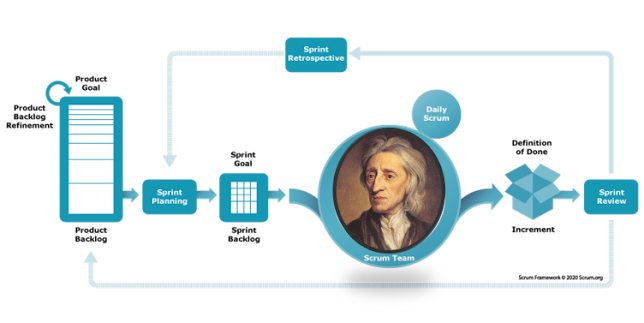Studying about Agile methodologies for the following certification that I want to get, I stumbled upon that Scrum has a close relationship with one of the well know philosphical approach: empiricism . As we know, those working in projects, doing product ownership and product management, the Scrum framework is widely adopted in software development and it owes a debt to that philosophical tradition that has its roots in the Renaissance and the Enlightenment age.
John Locke (1632–1704): “Nothing is in the understanding, which was not first in the senses.”
A glance about some baselines concepts: Philosophy began as an attempt to understand the world without relying on religious or mythological ideas. It was centered around two general questions: “What is the nature of reality?” (the subject of metaphysics) and “What is the nature of knowledge?” (the subject of epistemology). Answers to these questions fell into two main movements or schools of thought: rationalism, which treated reasoning as the most reliable source of knowledge, and empiricism, which stressed the importance of sensory experience.
The principle of empiricism emphasizes the acquisition of knowledge through sensory experiences and observation, which clearly resonates with Scrum's foundational pillars: transparency, inspection and adaptation
Empiricism and Scrum
When examining the Scrum framework (What is Scrum?), it is possible to make a direct line between the principles of empiricism and the three pillars of Scrum: Transparency, Inspection, and Adaptation.
- Transparency aligns with Bacon's advocacy for clear, observable phenomena as the foundation for acquiring knowledge. In the context of Scrum, this refers to the visibility of work processes and outcomes, ensuring that everything is open for observation.
- Inspection reflects the empiricist's emphasis on continual observation and assessment. Just as philosophers like Bacon and Locke stressed the importance of sensory experience as a basis for understanding, Scrum practitioners regularly inspect the work and the processes to ensure alignment with goals (mainly through artifacts, dashboards, etc).
- Adaptation, the final pillar, resonates with the empiricist's belief in adjusting beliefs based on new sensory experiences and observations. In Scrum, this means adapting processes based on insights gotten through inspection, ensuring that the methodology remains relevant and effective.
